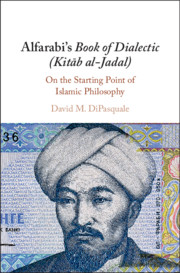Book contents
- Alfarabi’s Book of Dialectic (Kitāb al-Jadal)
- Alfarabi’s Book of Dialectic (Kitāb al-Jadal)
- Copyright page
- Dedication
- Epigraph
- Contents
- Preface
- Acknowledgments
- Introduction
- 1 Alfarabi’s Kitāb al-Jadal: A Complete English Translation
- 2 Dialectic and Political Science
- 3 Dialectic and the Principles of All Science
- 4 Dialectic and the Method of Natural and Divine Science
- 5 Dialectic and Education
- 6 Conclusion: Alfarabi and the Taxonomy of the Medieval Arabic Organon
- English–Arabic
- Arabic–English
- References
- Index
2 - Dialectic and Political Science
Published online by Cambridge University Press: 11 October 2019
- Alfarabi’s Book of Dialectic (Kitāb al-Jadal)
- Alfarabi’s Book of Dialectic (Kitāb al-Jadal)
- Copyright page
- Dedication
- Epigraph
- Contents
- Preface
- Acknowledgments
- Introduction
- 1 Alfarabi’s Kitāb al-Jadal: A Complete English Translation
- 2 Dialectic and Political Science
- 3 Dialectic and the Principles of All Science
- 4 Dialectic and the Method of Natural and Divine Science
- 5 Dialectic and Education
- 6 Conclusion: Alfarabi and the Taxonomy of the Medieval Arabic Organon
- English–Arabic
- Arabic–English
- References
- Index
Summary
The first matter to which the reader of the Book of Dialectic must attend is the fact that Alfarabi appears to offer two distinct starting points to his commentary. The first starting point, as we will have witnessed in Chapter One, begins at something of a technical height, with Alfarabi assuming a sophisticated level of learning on the part of those he is addressing. In Chapter Two, I consider the nature of the subsequent or ‘corrected’ starting point, which mimics the Aristotle of the Philosophy of Aristotle to the extent to which Alfarabi here begins from a more obviously commonsensical position. This is at the same time, then, to recall Alfarabi’s Plato and also (and above all) his Socrates. Because the new starting point is the recollection of the pre-scientific beginnings of science, which are themselves rarely subjected to scientific scrutiny, the role of the Law in instilling decent habits comes to the fore. We are then forced to consider the character of the kind of political science that is responsible for the creation of that Law in the first place.
- Type
- Chapter
- Information
- Alfarabi's Book of Dialectic (Kitab al-Jadal)On the Starting Point of Islamic Philosophy, pp. 117 - 145Publisher: Cambridge University PressPrint publication year: 2019

